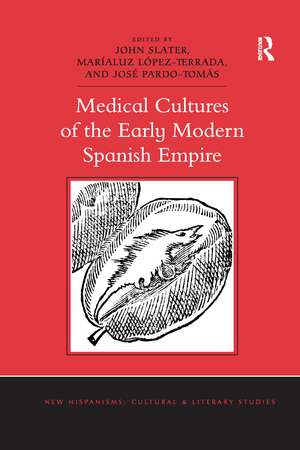Medical Cultures of the Early Modern Spanish Empire: New Hispanisms: Cultural and Literary Studies
Autor John Slater, Maríaluz López-Terrada, José Pardo-Tomásen Limba Engleză Paperback – 30 sep 2020
| Toate formatele și edițiile | Preț | Express |
|---|---|---|
| Paperback (1) | 389.88 lei 6-8 săpt. | |
| Taylor & Francis – 30 sep 2020 | 389.88 lei 6-8 săpt. | |
| Hardback (1) | 769.72 lei 6-8 săpt. | |
| Taylor & Francis – 10 oct 2014 | 769.72 lei 6-8 săpt. |
Preț: 389.88 lei
Nou
Puncte Express: 585
Preț estimativ în valută:
74.61€ • 79.78$ • 62.20£
74.61€ • 79.78$ • 62.20£
Carte tipărită la comandă
Livrare economică 17 aprilie-01 mai
Preluare comenzi: 021 569.72.76
Specificații
ISBN-13: 9780367669225
ISBN-10: 0367669226
Pagini: 326
Dimensiuni: 156 x 234 x 18 mm
Greutate: 0.46 kg
Ediția:1
Editura: Taylor & Francis
Colecția Routledge
Seria New Hispanisms: Cultural and Literary Studies
Locul publicării:Oxford, United Kingdom
ISBN-10: 0367669226
Pagini: 326
Dimensiuni: 156 x 234 x 18 mm
Greutate: 0.46 kg
Ediția:1
Editura: Taylor & Francis
Colecția Routledge
Seria New Hispanisms: Cultural and Literary Studies
Locul publicării:Oxford, United Kingdom
Cuprins
Medical Cultures of the Early Modern Spanish Empire
Notă biografică
John Slater is Associate Professor in the Department of Spanish and Portuguese at the University of California - Davis, USA. MarÃaluz López-Terrada is Senior Researcher (Investigadora cientÃfica) at the Instituto de Historia de la Medicina y de la Ciencia López Piñero, of the Spanish National Research Council (CSIC, Valencia), Spain. José Pardo-Tomás is Senior Researcher at the Department of History of Science in the Institucio ’Milà i Fontanals’ (CSIC, Barcelona), Spain.
Recenzii
"The essays are geographically and topically diverse, ranging from Spaniards among humanist circles in mid-sixteenth-century Trent to a natural history of hypertrichosis to a study of astrological medicine in Golden Age drama. This diversity brings to the discussion more voices and more actors whose concerns with the human body highlight rivalry and collaboration across political, religious, legal, literary, and medical frameworks…This volume successfully serves to open communications within the field, to bring together isolated voices from various disciplines from medicine to theater to politics, and to pose new questions about early modern Spanish medicine."
- Michele L. Clouse, Ohio University, Bulletin of the History of Medicine, Vol 90:1
"The book's core accomplishment is to bring forward a diverse array of medical representations offered through an eclectic consideration of narrative texts ranging from the imagined to the scientific... the chapters are unified by a coherent awareness of the need for deep interdisciplinary engagement with the formation of discourses about medicine within the early modern Spanish Empire. Overall, the book is a fine contribution to scholarship which couidl profitably be emulated in other fields of cultural, Empire and medical humanities in order to close the gaps in our understanding of the perspectives, stories and experiences of colonized peoples and their various medical cultures."
- Chisomo Kalinga, University of Edinburgh, British Society for Literature and Science
"The book is drawn together in an epilogue by William Eamon. He points out that Spain was different to the rest of Europe, but that Spain also made a difference to the broader scientific revolution that occuers in the Renaissance. In summary this book encourages readers to explore a wider genre of source materials than is conventionally the case."
- Robert Weston, The University of Western Australia
- Michele L. Clouse, Ohio University, Bulletin of the History of Medicine, Vol 90:1
"The book's core accomplishment is to bring forward a diverse array of medical representations offered through an eclectic consideration of narrative texts ranging from the imagined to the scientific... the chapters are unified by a coherent awareness of the need for deep interdisciplinary engagement with the formation of discourses about medicine within the early modern Spanish Empire. Overall, the book is a fine contribution to scholarship which couidl profitably be emulated in other fields of cultural, Empire and medical humanities in order to close the gaps in our understanding of the perspectives, stories and experiences of colonized peoples and their various medical cultures."
- Chisomo Kalinga, University of Edinburgh, British Society for Literature and Science
"The book is drawn together in an epilogue by William Eamon. He points out that Spain was different to the rest of Europe, but that Spain also made a difference to the broader scientific revolution that occuers in the Renaissance. In summary this book encourages readers to explore a wider genre of source materials than is conventionally the case."
- Robert Weston, The University of Western Australia
Descriere
As the Spanish empire grew, cultural ideas and practices related to sickness and health, sex, monstrosity and death came into contact and conflict. Old ideas took root in new soil, others were stamped out, and new cultures arose. This collection examines the dynamic context in which medical cultures circulated to propose new interpretations of the














